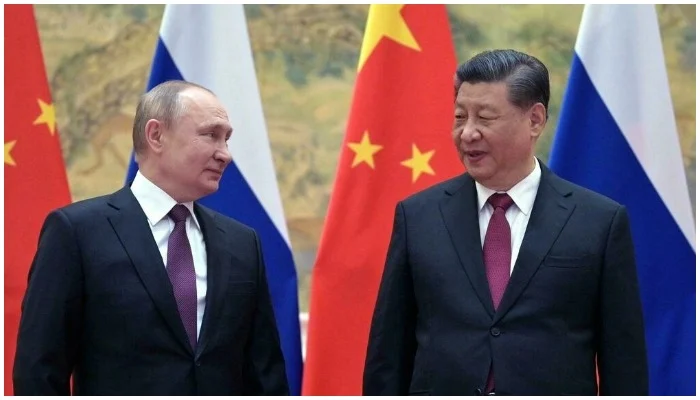Instead, the conflict may have already marked the start of a new Cold War, with the world divided between those who support Beijing and those who do not. On Friday, EU officials said they had received “very reliable evidence” that China was preparing to provide military assistance to Russia, echoing US threats of harsh sanctions if this occurred. That intention was refuted by Chinese Premier Xi Jinping, who said during a two-hour video call with US President Joe Biden: “State-to-state relations cannot advance to the stage of confrontation, and conflicts and confrontations are not in anyone’s interests.”
While Beijing has not officially condemned Russia’s invasion, which began only 20 days after Beijing signed a “no limits” strategic partnership with Moscow, signs of domestic discontent have emerged.
An article published three weeks ago by prominent Shanghai academic Hu Wei condemning Russia’s actions was allowed to remain online for a fortnight before being removed, implying support at the highest levels.
He urged China to distance itself from Putin, abandon neutrality, and embrace the global mainstream position, adding that efforts to avert a potentially nuclear war would improve relations with the West.
On Wednesday, US Ambassador Qin Gang claimed that China had “no prior knowledge of Russia’s military action,” adding that Beijing, which relies on Ukraine for critical rocket components and grain, would “have done everything we could to prevent it.”
Whether or not this is true – many suspect China was duped by Russian assurances of a quick victory – it could herald a face-saving way for China to change its stance on a war that is causing deep domestic divisions.
The following day, China’s state-owned media was allowed to report briefly on the deaths of Ukrainian civilians in Chernihiv at the hands of Russian rockets.
On Thursday, a flight carrying Russian Foreign Minister Sergei Lavrov to Beijing returned to Moscow while still over Siberia.
The seven-member Politburo Standing Committee, the CCP’s top decision-making body, is said to be divided on Russia. If Xi wants to extend his party chairmanship for another five years at the 20th Party Congress in October, he will need the committee’s support.
However, Politburo members are said to be unimpressed by Putin’s colonial rhetoric used to justify his claim to Ukraine, language that China’s many African supplicants find particularly disturbing.
Both sides in Ukraine are already using commercially available Chinese-made DJI surveillance drones.
On the basis that it is only replicating Western efforts, China – whose weapons are largely Russian in design – could expand this to include spare parts for Russian fighter jets and even ammunition.
However, reports from the US indicating that China will do so have not been confirmed by US intelligence briefings, and have been attributed to anti-China rhetoric ahead of Biden’s important midterm elections.
Former diplomat and China expert Matthew Henderson added, “There are signs that Beijing may be reconsidering.” China does not want a full-fledged shooting war with NATO, in which Xi would be forced to take sides.”
“The average Chinese person isn’t interested in partnerships with Russia; they want to know what the Party is doing to help.”
However, China’s resolution of its Russian issue is not necessarily good news for the West.
“Within five or ten years, we may well be living in a bipolar world – you can see it coming,” Cheng predicted.
“Xi prioritises China, and he is terrified of the West’s concerted effort to economically isolate Russia.”
“This crisis has made him extremely serious about financially shielding China from what Russia is going through.”
Made in China 2025 and China Standards 2035 are already initiatives aimed at increasing China’s economic self-sufficiency. However, it is now doubling down on the development of its own SWIFT network, which will operate in parallel in each country where it has significant investments.
“As soon as Germany agreed to sanction SWIFT, China’s top priority became neutralising it within the next three to five years, before invading Taiwan,” Cheng added.
Though economies remain globally intertwined, there may come a time when strategic neutrality is replaced by the need to choose sides.
Countries such as Pakistan appear to have done so already. As his tanks rolled into Ukraine, Prime Minister Imran Khan, who is heavily indebted to China, was negotiating a wheat and natural gas deal with Vladimir Putin.
And it is no coincidence that both Iran and North Korea chose to launch missile strikes and tests now, when the US and its allies required all surveillance assets to be focussed on Ukraine.
China chose to sail several vessels illegally into Philippine waters ahead of the Biden meeting, despite the fact that Washington DC has a defence treaty with Manila.
South Korea’s new President Yoon Suk-yeol, on the other hand, has already signalled greater caution toward China and a strengthening of security ties with the US.
Even India, the world’s largest democracy, which now has the hard currency to buy sophisticated US weapons and has welcomed Western assistance against an increasingly aggressive China, may not be able to maintain its neutrality indefinitely.
“This conflict will have a significant impact on strategic trust,” said Riccardo Cociani, Asia Pacific analyst for Sibylline strategic risk group. Things we may have taken for granted in the past do not apply anymore.
“If we are back in some form of a new Cold War in five or ten years – over technological supremacy, for example – the Ukraine conflict could be regarded as the time when this Cold War first went hot.”




















